Rimac CEO Says High-End Buyers Don’t Want Electric Hypercars Anymore

The desire for electric hypercars is already dwindling. Rimac CEO Mate Rimac said this week that buyers at the high end of the market want to differentiate themselves as EVs go mainstream. They want combustion engines and an analog feel, not what the masses buy.
Mate noted during this week’s Financial Times Future of the Car Summit that a lot has changed since Rimac began developing the Nevera around 2017. While EV sales are slowing, consumers around the world have access to far more affordable options than they did a few years ago.
Governments have imposed strict regulations to spur EV adoption, and several automakers have already pledged to sell only EVs by a specific date. But some are open to altering those plans. Those forces are “pushing stuff on us that we don’t want,” and people are “a little bit repulsed by it,” Mate said, leading to a decline in demand for high-end EVs that's affecting his brand.
The Nevera hypercar is still for sale. The company has already delivered more than 50 cars to customers, but it had plans to produce 150 in total.
Falling demand and a shift in consumer trends mean that a Nevera successor might have some form of combustion power, Rimac suggests.
"Rimac isn’t exclusively electric; it’s doing whatever is most exciting at the time,” he said.
A pure EV won’t cut it, but a potent hybrid might, which might be one reason the Bugatti Chiron successor is getting that wild V-16 hybrid engine. Mate revealed in 2022 that two years before merging with Bugatti, Rimac had already started developing a combustion engine. The writing was on the wall.
Nouvelles connexes


